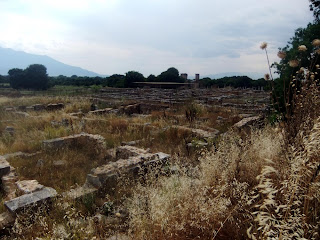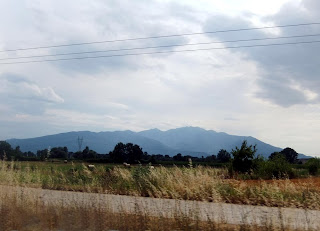Philippi is famous not as a town but as the site of the final battle between Octavian and Anthony on one side, and Brutus and Cassius on the other. It was here that the fate of the Republic was decided. This was a major battle with around 100,000 men on either side. The battle was actually two battles fought on the same plain several days apart. On the first day Marc Antony took Cassius' camp while Brutus took Octavian's, but due to the confusion of battle Cassius thought that all was lost and killed himself leaving Brutus to lead the troops in the next confrontation. He wasn't up to it. Apparently the Liberators were in front of the town while the Caesarean forces formed up further out. It would be really difficult to overstate the importance of these battles. Because of this the Republican cause died for good. Cicero was already murdered, Cato had killed himself a few years before, and now Cassius and Brutus joined him. The only major figure left for the Republicans to form up with was Sextus Pompeius. At this point Antony and Octavian were the unquestioned masters of Rome.
Brutus: Why comest thou?
Ghost: To tell thee thou shalt see me at Philippi.
At Philippi our luck ran out. These guys intended to honor the strike and they were manning the place to make sure that nobody snuck in anyway. But although we may not have gotten to go into the site we could still see most of it from the roads.Still unfortunate given that its two hours east of Thessaloniki.
This is the Greek theatre at the bottom of the mountain. It's one of the nicer spots in Philippi and it's a real shame we couldn't see more of it. This is as close as we got and my camera has a real good telephoto lens.
There were a lot of remains from the city. You can see several blocks with their foundations intact. I think that there were more remains here than pretty much any other city we went to.
This building was the most impressive. I believe that it is the Library of Hadrian but since we never got in I can't tell for sure. Actually it may be the Basilica of Paul. Supposedly he had a giant cathedral around here.
Just like with Pella we have nice ordered streets. The city was rebuilt as a veterans colony after the battle which led to much new construction work. The town's connection with early Christianity helped it grow as well until it became a fairly affluent city. Unfortunately the place was hit bad by an earthquake in the 600s and never recovered. Fortunately for us though the new town is located about a mile away which means that most of the remains survive.
This is the Church of Lydia. The other thing that makes Philippi famous is its connection with Christianity. Paul preached in Philippi and apparently one of his converts was a woman called Lydia who founded a church. Not this church of course. This one looks like a Byzantine model. But I guess that it was built on the same site as the old one. This place wasn't open either, although not because of the strike. Imagine if the priests went on strike as well. That would be something.
These are the fields surrounding Philippi. The perfect place for a battle don't you think? If you've ever seen Rome then you'll remember this place as a desert surrounded by mountains. While the mountains part is broadly true the fields are nice and fertile looking. Sorry HBO, but wrong again. Why couldn't you choose somewhere that looked a bit more like northern Greece? Watching it one might have thought that Philippi was in the Middle East.
Brutus: Why comest thou?
Ghost: To tell thee thou shalt see me at Philippi.
At Philippi our luck ran out. These guys intended to honor the strike and they were manning the place to make sure that nobody snuck in anyway. But although we may not have gotten to go into the site we could still see most of it from the roads.Still unfortunate given that its two hours east of Thessaloniki.
That pointy hill in the distance is Mt. Orbellos. The city itself is located at the foot of the hill. The rest of the area is one big plain. It didn't really look it when we were there but it was apparently swampy during the Classical Era. Octavian spent most of the first battle hiding in these swamps.
This is the road leading up to Mt. Orbellos. The main part of the city is behind us but you can see the walls to our right. I believe that these were Byzantine in construction but I could be wrong. If these are the original walls then they're a pretty impressive survival. There were many sections of wall scattered around the outskirts of the city. At the foot of the mountain is the parking lot and a small restaurant. It looks like a nice place and seemed fairly busy for a place on strike. It must be a fairly popular site which makes me wonder why it wasn't listed on my guidebook.This is the Greek theatre at the bottom of the mountain. It's one of the nicer spots in Philippi and it's a real shame we couldn't see more of it. This is as close as we got and my camera has a real good telephoto lens.
This building was the most impressive. I believe that it is the Library of Hadrian but since we never got in I can't tell for sure. Actually it may be the Basilica of Paul. Supposedly he had a giant cathedral around here.
Just like with Pella we have nice ordered streets. The city was rebuilt as a veterans colony after the battle which led to much new construction work. The town's connection with early Christianity helped it grow as well until it became a fairly affluent city. Unfortunately the place was hit bad by an earthquake in the 600s and never recovered. Fortunately for us though the new town is located about a mile away which means that most of the remains survive.
These are the fields surrounding Philippi. The perfect place for a battle don't you think? If you've ever seen Rome then you'll remember this place as a desert surrounded by mountains. While the mountains part is broadly true the fields are nice and fertile looking. Sorry HBO, but wrong again. Why couldn't you choose somewhere that looked a bit more like northern Greece? Watching it one might have thought that Philippi was in the Middle East.
This is a last look at the plain of Philippi (OK. It's probably called something else. But I like the sound of this better). The next day we caught the plane back to England, cutting the trip short by a week and a half. This city was as close as we got to Turkey being about 100 miles from the border. The strike had expanded to include air traffic controllers so all flights to and from Greece were cancelled. Fortunately for us Thessaloniki was less unstable than Athens. We saw protestors but no rioters. Even more fortunately the strikes in Macedonia Airport didn't last to the next day so we were all able to catch our flight with no problems. And that was the end of the trip. Hopefully I'll get the chance to go back someday, but for now I can't really say that I didn't get to see the country. I think we did about as much as is humanly possible in the short time we had. Rental cars are amazing things.
| The First Battle of Philippi |
| The Second Battle of Philippi |














No comments:
Post a Comment